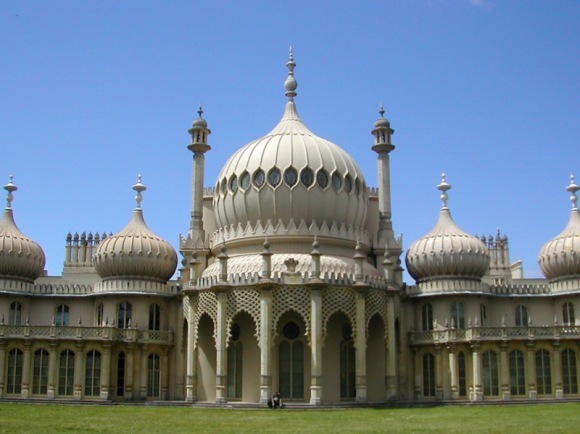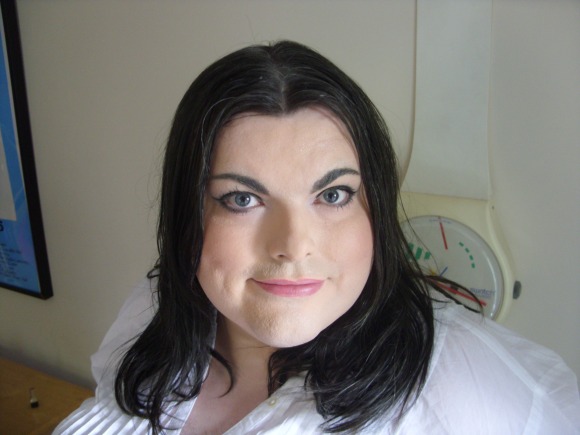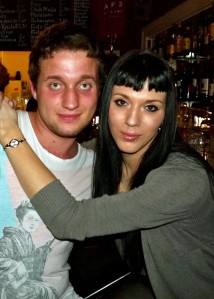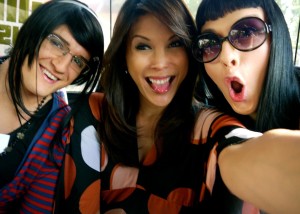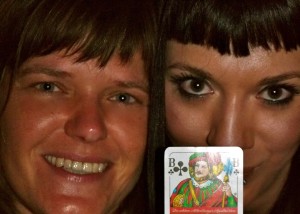This post is taken from a speech I made at a conference in Leeds last month, Recognising Diversity? Gender and Sexual Equalities In Principle and Practice.

All About Trans… volunteers chat with Channel 4 News anchor Cathy Newman
• I know, through my activism and engaging with people online, that I’m not alone in feeling wholly misrepresented by mainstream media.
• I could list statistics that show how unhappy trans people are with the way they are portrayed in the media, but that doesn’t quite capture the depressing feeling of disappointment described, rather eloquently, by American writer and news editor Janet Mock.
• Last year she wrote:
“As a trans woman, there’s rarely a time when I’ve been able to applaud the portrayal or someone’s commentary on a woman like myself in mainstream media. As a fan of many shows, entertainers and writers who’ve belittled “my people,” I have a bittersweet relationship with what I consume. If I wrote off every famous person or show that offended me, I would have nothing to watch.”
• So what do we do with this mass depression, this feeling of powerlessness?
• Well, as I’ve found with my own depression over the years, we have to get up and do something.
• I’m not a fan of reactive activism, and I’m not sure that new regulations are the answer either – trans people are already supposedly protected under the existing PCC guidelines. These guidelines simply need enforcing.
• That’s why I’m extremely excited by a project called All About Trans, which connects media professionals with real trans people.
• We’re supported by the BBC and Esmee Fairbairn Foundation and the idea is to simply get influential people into the same room as trans people and create empathy.
• We hope that if we can put a human face on trans we can remove the caricature and make the people with power in the media think twice next time a script, or article or proposal lands on their desk that ridicules people like me simply for being trans.
• Last month we met with the editor of the Observer John Mulholland for a nice cup of tea; the week before that we took some BBC comedy excs to the aquarium for the day.
• Everyone had a great time and those media professionals now have a memory of a fun afternoon out with people not so very different from themselves.
• It shouldn’t be necessary to remind media professionals that we are human beings worthy of respect – but sadly it is.
• It’s tempting to want to explain ourselves as trans people.
• Many trans women still feel they have to sell their transition narrative to get their voices heard in the media and that narrative has to conform to certain cisgenderist cliches of binary transformation from one essential to another i.e. ‘trapped in the wrong body’ or the ‘before and after’
• Even I’ve been tempted to do this before. And I’ve had plenty of opportunities.
• The problem with trans narratives, though, is that they are almost always in response to a cisgender, that is, non-trans-demand.
• My good friend and historian Jeff Evans, who does fantastic work getting LGBT History Month taught widely and well in schools, tells me that he is often asked if he can talk about the history of gay men.
• There is no such history.
• “Gay men” as an identity is a relatively recent social construct and it is not possible to write a history of gay men.
• Men who have sex with men, however, have always existed.
• What we can do is look at how society has treated those men.
• So it is for trans people. The idea of a “trans woman” which is how someone like me might describe herself, is an even newer concept.
• We can’t do a history of trans women or indeed trans men as none exists.
• Trans people, or people who do not fit neatly into one gender or the other, however, have always existed.
• The story isn’t about how trans people came about – and that’s not to say that recent medical opportunities have not made life easier for many trans people – but how societies have dealt with us.
• This isn’t about trans people and it never was.
• It’s about everybody else and how comfortable they feel about letting trans people exist and express themselves.
• So the problem, then, with trans narratives is that they invariably set out to explain and justify and mitigate the difference (or ‘otherness’) of those telling the story.
• Essentially this narrative boils down to “My life is horrible, please be nice to me!” – I’ve been guilty of slipping into this rhetoric myself at times.
• Ultimately this hands power to the person hearing the story. It’s a form of begging, begging not to be bullied.
• Do you think bullies listen to such pleas?
• This approach may work with some people who are borderline hostile towards trans people or may illicit sympathy from people who would have been supportive however they were awoken from their ignorance.
• The thing is though, this “poor me” pathetic transsexual narrative has been going on for over 60 years and it doesn’t appear to have made a huge difference to the way people like me are treated on the street.
• If you walk into a bookstore you will find whole sections devoted to LGBT writers.
• Some of these will be confessional biographies. Many will be by trans women.
• Many will be theoretical books.
• During my time as Acting Assistant Editor of Gay Times I was sent many academic books that tried to unravel what it means to be gay, to be queer, to be gender non-conforming.
• What is it all for?
• This is a conference to discuss complex ideas so perhaps this is an odd platform from which to present my message today.
• But trans people and anyone with an interest in gender diversity have to stop trying to dissect everything and anything about our experiences.
• It’s all just Trans 101 and trans 101 doesn’t work.
• We are othering ourselves.
• I’m only going to reference just two books today: the first is Edward Said’s Orientalism and the second is Julia Serrano’s Whipping Girl.
• Edward Said helped popularize the term ‘othering’ in his seminal text, Orientalism.
• He argued that, in the West, we have an idea of what it means to be Eastern; we have stories and myths about Eastern people about how they are and what they do – based on the severely limited and prejudicial but unchallenged understanding of a few early colonialists.
• Mysterious, exotic, licentious, workshy, deluded, devious essentially childish and incapable of making sensible decisions about what is best for them, immutable, incapable of changing for the better – where ‘better’ means behaving in the same manner as the ascendant culture
• These are some of the characteristics attributed to “oriental peoples”
• We’ve heard it applied to other ethnic groups, to other marginalised groups and, of course, to women.
• Such words summarise the assumptions of misogyny, the same misogyny that Julia Serano identifies as transmisogyny
• Serrano cuts through all this bullshit in her wonderful polemic, Whipping Girl, and at the end of it I was left feeling angry but also with a deep sense of “Wonderful, why did that even need writing?”
• Trans people just are. Get over it.
• Treat us with dignity. What more is there to say?
• If you’re still keen on your academic theory, I urge you to check out a researcher and thinker called Y. Gavriel Ansara. He has been key in developing an academic outline of cisgenderism and he points to the “invisible college” of academics researching trans people.
• They are usually white, male, educated and middle aged. They reference each other’s work… they write prolifically and build up each other’s status as experts on trans issues.
• They are consulted when the time comes to redraw health guidelines on trans people – guidelines that almost always problematize trans people.
• This, too, is built out of nothing.
• Trans people are people, and that’s all there is to it really.
• My activism used to be rather reactionary, we’d sit around waiting for something awful to happen and then get angry and say please don’t be horrible to us we have such awful lives as it is.
• Now, with All About Trans we answer questions honestly and explain issues to them but we are more focused on what they can do to help us make things better.
• We ask them what the problem is. Why the big fuss?
• It’s a positive dialogue and one in which trans people are not explaining themselves but politely asking to be treated with respect and enquiring as to why that is not currently happening.
• It’s very simple for me.
• I feel happiest expressing myself the way I do and being referred to and perceived by others a certain way. I don’t need to know why.
• I hope the younger generation of trans people can continue looking outwards and force the mainstream to take a long hard look at itself instead of obsessing over trans people.
• Positive, unapologetic engagement is how we make things better and do I hope you’ll check out the great work we’re doing by visiting AllAboutTrans.org.uk.

